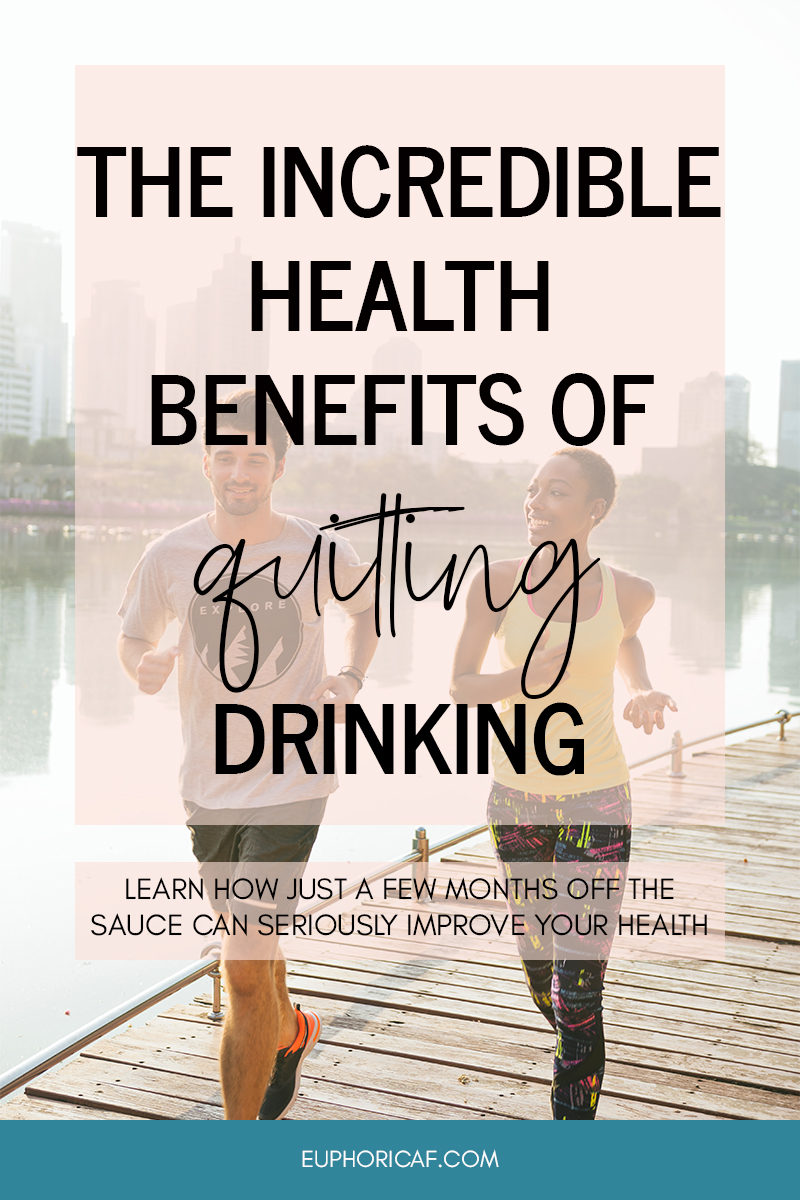The Health Benefits of Not Drinking
By Karolina Rzadkowolska
I wish I had heard of Dry January (or any dry month of the year) a long. ass. time. ago. It’s popular in the UK to ring in the new year with a period of abstinence to reset habits and get healthier. Say you’re doing dry January in England, and hardly anyone bats an eye—over 5 million people participate each year and the success of this initiative is owed to the experts behind public health campaigns. (In addition to Dry January, there’s also Dry July and Sober October).
Of course, one month off alcohol isn’t a magic fix all to resolve drinking issues and remove a habit, but for me it completely opened the door to explore my own relationship with alcohol and evaluate its role in my life. I did dry January in 2018. By May of that year, so enamored by the benefits, I decided to quit drinking for good and started living my absolute best life.
So you see, I wish I heard about dry January a lot earlier because the effects of not drinking are magical—and what it does to your health is astounding. The health effects of quitting drinking are so incredible, there is probably nothing better you could do for your body than abstain from alcohol. If you could package all the health effects of sobriety in a pill, pharmaceutical companies would make BILLIONS. And it doesn’t take too long for these effects to announce themselves. If you haven’t challenged yourself to a dry month, what do you have to lose?
I honestly had no idea so much healing could be done in such a short time. Any regular drinker would benefit so much from an alcohol-free challenge to reset and re-balance their health, and rethink their automatic habits around alcohol. Let’s explore some of the incredible health improvements and benefits quitting drinking or even just a short break can bring.
Liver Health
Some people rightly worry about drinking’s effect on their liver, but most consider this a consequence only of severe problem drinking, which is definitely not true. As craft beer and mommy juice culture dominates, doctors have seen a spike of liver issues from non-problem drinkers over the years, especially for women and at much younger ages.
But even this scary consequence can be improved by quitting or taking a break. Just a month or two off alcohol can considerably improve liver health. A team of liver specialists found that just five weeks abstaining from alcohol decreases liver fat by 15-20 percent. This is great news, because fat accumulation on the liver is the prelude to liver damage.
Heart Health
Roughly forty percent of American adults are worried about their cholesterol and have levels above 200 and two out of every three adults has either high blood pressure or pre-hypertension. There are countless diets and exercise plans that try to help people lower both of these. And if that doesn’t work, doctors prescribe medication. High blood pressure and cholesterol are crucial risk factors when it comes to heart attack risk and general heart health and they lead to the development of atherosclerosis over time.
But isn’t red wine good for the heart? Turns out, no, not really, the risks far outweigh any benefits, which may have been inflated due to poorly designed studies. If heart disease is America’s number one killer you would think we would know that quitting or taking a break could lower both cholesterol and blood pressure. A study exploring the effects of dry January showed that just five weeks of not drinking can lower blood cholesterol between 10-20 points.
There’s also a clear link that drinking alcohol leads to high blood pressure, and not just excessive drinking. The study "Drinking pattern and blood pressure among non-hypertensive current drinkers: findings from 1999–2004 National Health and Nutrition Examination Survey" found that less than one drink per day rose blood pressure by 1 mmHG. Over time that makes a difference. Thankfully, the study also showed that the effects of alcohol on high blood pressure are rapidly reversible. My blood pressure dropped by ten points off both my systolic and diastolic numbers. And you can expect to see a decrease too.
Brain Changes
Drinking alcohol shrinks the gray matter in your brain and develops a strong system of neural pathways that have learned to crave alcohol. While this does fundamentally change the brain, studies show that just within two weeks of quitting, gray matter starts to grow back. Between six months to a year of abstinence, it grows back completely to the levels of a pre-drinker. After a year, something really incredible happens. Gray matter grows beyond that of where it was before ever drinking. And as you change your habits and routines, neurons regenerate and new neural pathways are developed in your brain. People who quit drinking are actually better adept at self-control and have more resiliency and neuroplasticity than someone who never struggled at all.
Cancer Markers
Alcohol has been classified as a toxic carcinogen since 1988. It is strongly implicated in cancer, in that it causes over 20 different kinds. And this isn’t just for heavy drinkers. Unfortunately studies have proven that even 2-3 drinks a week increases a women’s risk of getting breast cancer by up to 15 percent.
Two to three drinks a week? I would have thought I was a healthy maven if I could limit my drinking to just two to three drinks a week! Unfortunately all levels show a risk relationship, even low levels of consumption, and cancer organizations are saying there is no safe level of consumption.
But the good news. Even with cancer, we have evidence that abstaining can improve our risks. In the study, “Short-term abstinence from alcohol and changes in cardiovascular risk factors, liver function tests and cancer-related growth factors: a prospective observational study,” scientists found that abstaining from alcohol for one month improved markers associated with cancer. They found a “a decrease in circulating concentrations of cancer-related growth factors following a month of abstinence from alcohol.” Very promising indeed.
Sleep Improvements
Many people wrongly assume that alcohol helps them sleep, but in reality it sedates you to sleep. Alcohol induces slow-wave sleep for the beginning of the night, explaining why you can typically zonk out for a few hours. But after about 4-5 hours, the depressant nature of alcohol wears off, leaving by-product stress hormones in the body which may very well wake you up at 3 or 4 am and will definitely fragment sleep. I remember so many rough nights tossing and turning at around 3 or 4 am, thinking I was an anomaly. I had no idea this was the normal effect of alcohol on sleep.
Alcohol also prevents you from getting adequate REM sleep, which is vital for brain nourishment and feeling rested the next day. Unfortunately, studies show that all dosages of alcohol increase sleep disruption during the second half of the night and decrease total REM sleep. The average human spends the night in five cycles of the sleep cycles culminating in REM sleep, lasting about 90 minutes per cycle. When alcohol reduces your REM sleep cycles to 1 or 2, it’s effectively robbing you of the sleep your brain needs to develop. That means that even if you are clocking in eight hours, you aren't getting the nourishing sleep your body needs. Lack of quality sleep has been linked to a host of health issues and is directly tied to life expectancy. It makes us feel lethargic, cranky, sad, and short-tempered. Studies show it leads to cancer, diabetes, and depression. Within two weeks of quitting alcohol, most people report improved levels of sleep. For me, there is absolutely no comparison. I sleep like a baby and I don’t wake up in the middle of the night anymore. My body isn’t working on overdrive to detoxify a poison, it’s just resting and it feels so heavenly.
This is no small stuff. Want to change your life? Take a break from drinking. Make it the best month of the year with my guide, Take a Month off Drinking and FEEL AMAZING.
If Health Benefits of Sobriety Were Sold in a Pill, pharmaceutical companies would make billions.
Sources:
“The Biology of Desire: Why Addiction Is Not a Disease.” The Biology of Desire: Why Addiction Is Not a Disease, by Marc D. Lewis, Anchor Canada, 2016.
https://www.wsj.com/articles/the-dry-january-effect-11546351200
https://mental.jmir.org/2018/1/e23/?mod=article_inline
https://www.sciencedaily.com/releases/2013/01/130122162236.htm
https://pubs.niaaa.nih.gov/publications/arh25-2/101-109.htm?mod=article_inline
https://bmjopen.bmj.com/content/8/5/e020673?mod=article_inline
https://pubs.niaaa.nih.gov/publications/arh294/245-255.pdf
http://ascopubs.org/doi/full/10.1200/JCO.2017.76.1155
https://www.ncbi.nlm.nih.gov/pubmed/27130687
https://nutritionfacts.org/video/is-it-better-to-drink-little-alcohol-than-none-at-all/
https://myslumberyard.com/blog/how-does-alcohol-affect-sleep/
I’m Karolina Rzadkowolska
I’m a certified alcohol-free life coach and bestselling author who specializes in helping highly intuitive women make alcohol insignificant and harness their true potential.
My book, Euphoric: Ditch Alcohol and Gain a Happier, More Confident You helps regular drinkers let go of limiting stories around alcohol and step into their truer purpose.
Learn more about my coaching programs and online courses to take the next step. I’m so happy you’re here.













